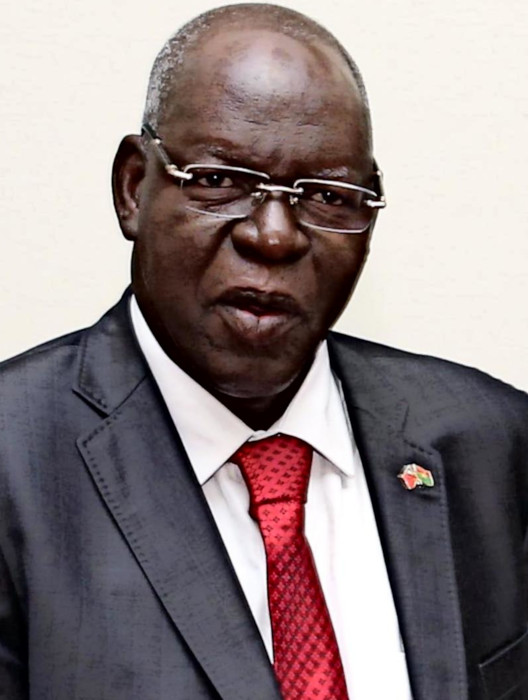


Salif Diallo (1957–2017) was a prominent Burkinabé politician and a key figure in Burkina Faso's political landscape. Known for his significant influence in shaping the country’s political direction, Diallo played a critical role in both the government and the ruling party over several decades. He was closely associated with the late President Thomas Sankara and later with President Blaise Compaoré, before becoming a leading opposition figure.
Birth and Background: Salif Diallo was born on May 9, 1957, in Ouahigouya, a town in the northern part of Burkina Faso, then known as Upper Volta. He belonged to an influential family and was well-educated, which allowed him to rise quickly in the ranks of Burkinabé politics.
Education: Diallo pursued higher education in political science and international relations, which equipped him with the knowledge and skills that would later define his political career. He studied at the University of Ouagadougou and later in Paris, where he further honed his understanding of political systems and governance.
Association with Thomas Sankara: Salif Diallo began his political career as a close associate of Captain Thomas Sankara, the revolutionary leader who came to power in 1983. Diallo served as a key advisor and played an important role in the implementation of Sankara’s radical socialist and Pan-Africanist policies, which aimed to reduce poverty, promote self-sufficiency, and fight corruption.
Role in Blaise Compaoré’s Government: After the assassination of Thomas Sankara in 1987, Blaise Compaoré took power, and Diallo became one of Compaoré's most trusted allies. Over the next two decades, Diallo held various key positions in Compaoré’s government, including Minister of Agriculture, Water Resources, and Fisheries, and later, Minister of Environment and Sustainable Development. He was known for his strong administrative capabilities and his influence within the ruling party, the Congress for Democracy and Progress (CDP).
Key Policy Initiatives: During his time in government, Diallo was instrumental in promoting agricultural development and environmental sustainability in Burkina Faso. His policies were aimed at improving food security, managing water resources, and addressing desertification, issues critical to the largely agrarian economy of Burkina Faso.
Break with Compaoré: In the years leading up to 2014, Salif Diallo became increasingly critical of Blaise Compaoré’s regime, particularly Compaoré’s attempts to amend the constitution to extend his stay in power. Diallo eventually broke away from the CDP and became a leading figure in the opposition.
Founding of the MPP: In 2014, Diallo co-founded the People's Movement for Progress (Mouvement du Peuple pour le Progrès, MPP) with Roch Marc Christian Kaboré and Simon Compaoré (no relation to Blaise Compaoré), who were also former allies of Compaoré. The MPP quickly gained popularity as the leading opposition party. Diallo’s leadership and organizational skills were crucial in building the MPP into a formidable political force.
2014 Burkinabé Uprising: Diallo was a significant figure during the 2014 Burkinabé uprising, which led to the ousting of Blaise Compaoré after 27 years in power. The MPP played a key role in mobilizing the public against the constitutional changes proposed by Compaoré, which would have allowed him to extend his presidency.
President of the National Assembly: Following the 2015 elections, in which the MPP won a majority, Salif Diallo was elected President of the National Assembly of Burkina Faso. In this role, he continued to exert significant influence over the country’s political direction, working to strengthen democratic institutions and promote transparency and accountability in government.
Death: Salif Diallo passed away unexpectedly on August 19, 2017, in Paris, France. His death was widely mourned in Burkina Faso, where he was seen as a pivotal figure in the country’s recent political history.
Legacy: Salif Diallo left a lasting legacy in Burkina Faso’s political landscape. He is remembered as a skilled strategist, a committed public servant, and a central figure in the country’s transition from authoritarian rule to a more democratic system. His role in both the revolutionary government of Thomas Sankara and the opposition movement that ended Blaise Compaoré’s long rule makes him a significant figure in Burkina Faso’s history.
Impact on Politics: Diallo’s efforts to promote agricultural development and environmental sustainability have had a long-term impact on Burkina Faso’s policies in these areas. His leadership in the National Assembly also helped to establish a more robust legislative framework in the post-Compaoré era.
Salif Diallo was a complex and influential figure in Burkina Faso’s political evolution. From his early involvement with Thomas Sankara’s revolutionary government to his critical role in the fall of Blaise Compaoré, Diallo’s political career spanned some of the most turbulent and transformative periods in Burkina Faso’s history. His contributions to the country's development and his efforts to promote democracy and good governance continue to be recognized and respected in Burkina Faso and beyond.

We use cookies
We use cookies and other tracking technologies to improve your browsing experience on our website, to show you personalized content and targeted ads, to analyze our website traffic, and to understand where our visitors are coming from. Privacy Policy.